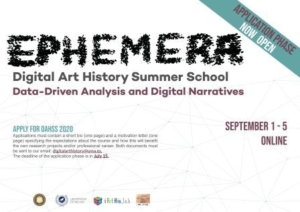Digital Art History Summer School: Ephemera in Digital Art History
The #BlackLivesMatter movement and the rapid spread of global demonstrations around the world are producing a considerable amount of cultural manifestations that, due to their own nature, are ephemeral. Nevertheless, their impact is permanent as they change the course of human consciousness. This circumstance compels us to reflect about how and why to preserve –whether this is possible- these ephemeral cultural productions and how to produce digital outputs that allow us to comprehend these cultural manifestations, their transformative impact, and their full complexity. Cultural productions are complex systems with multiple dimensions, layers and trajectories. Computational techniques and digital media give us tools, methods and analytical strategies to deal with this kind of multifaceted nature phenomena that, moreover, continuously reconfigure as they are disseminated and appropriated by different communities.
DAHSS2020 aspires to delve into the notion of ephemera and their complexity proposing to participants to work together in a common project from different perspectives.
The course has a theoretical-practical orientation: theoretical exchange and critical discussions will be combined with practical sessions (lab-based sessions) through which participants will work collaboratively.
The course is organized around four tracks.
Track A: Data and the Arts, lead by Greg Niemeyer (UC Berkeley).
Track B: Data Science, led by Harald Klinke (LMU Munich).
Track C: Digital Photography: Detecting and Visualizing Forgery using Image Processing and AR, led by Justin Underhill (Visualization Lab for Digital Art History, UC Berkeley).
Track D: Computer Vision, lead by Leonardo Impett (Bibliotheca Hertziana).
Fee: 100€
Places: 30
The organization will cover enrollment expenses of 4 participants from Latin America
The application period is now open (until July 26th, 2020). Please, visit: http://historiadelartemalaga.uma.es/dahss20/applications/




